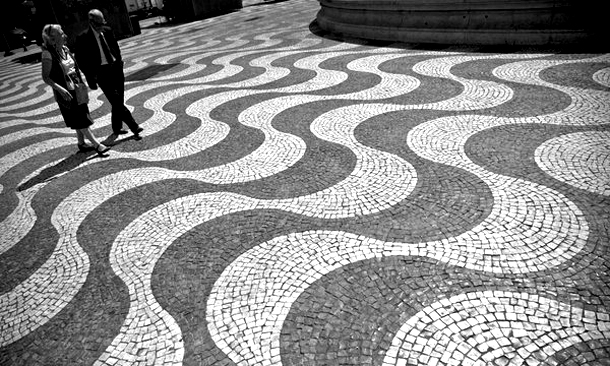
We meet the places we wind up loving much the way we meet the people we fall for: on purpose and accidentally; at precisely the right moment and exactly the wrong time; in the highest of spirits and the lowest of moods.
Immediately we noticed the castle. You can’t fail to. Medieval and partly Moorish, it sits astride one of the highest of the city’s many hills, both a topographical and an emotional point of reference, somewhat like the Parthenon in Athens. Your eyes are drawn to it. The rest of you, too.
“What do you think?” I asked my companion, Tom, nodding in its direction. I was contemplating all the eating and drinking we’d be doing in the week to come and calculating how useful some uphill walking would be as a metabolic down payment.
“Might as well,” he said. “The exercise will keep us awake.”
We didn’t plot a route. We intuited one. So the beauty we encountered was serendipitous: the mosaics of black and white stone with which so many of the sidewalks, esplanades and plazas are paved; the tiles — yellow, green, white — with which so many of the buildings are faced. Mosaics like these I’d seen elsewhere, though they had a special dominance and whimsy here. But tiles like these, used this way, were a revelation. It was as if Lisbon wore a set of jewels that other cities didn’t bother to.
We climbed higher. And higher. And soon two colors took precedence over the others: the red of the roofs, terraced on the hillsides below us; and the blue of the Tagus River and the harbor, flashes of which entered and exited our field of vision depending on where we were standing. A major port in a country with a rich and proud seafaring history, Lisbon has a connection to the ocean — the Tagus meets the Atlantic only a dozen or so miles away — that is essential, intimate and palpable. It’s one of those places that’s not just on the water but of the water.
“I’m coming back,” I told Tom, because what I experienced during those first few hours, despite my exhaustion and wrinkled clothing and matted hair and overarching physical wretchedness, was a blush of the true, unfettered romance that I’d longed for and forced myself to feel in cities more clucked about, cities more fabled.
That was two years ago, and come back I did: not just for another 24-hour pause en route between Oporto and New York but again last September and then, yet again, in April. And that won’t be the end of it, because Lisbon and I, we sparked. And as I continue to revel in that, I continue to try to figure it out.
After all those other European capitals, each so splendid in its own way, why this one?
I COULD argue that this is a particularly good moment to visit Lisbon, and for a few paragraphs I will, though the truth of the matter is that I don’t think Lisbon needs any recommendation beyond the blessed fact of it. It warranted attention and favor years ago and will warrant them years hence.
As for now, well, there’s a clear economic rationale. Times aren’t flush, and Lisbon presents a noticeable price break from London, Paris, even Rome. It’s faded imperial glory on the cheap: Western Europe marked down 20 to 30 percent. And Portugal’s economic woes — it’s currently in a fiscally austere league with Greece, Spain and Ireland — have in some sense unleashed a creative spirit among its people, who are taking chances, improvising and, as it happens, trying to boost tourism. Outside money is one answer to inside need
Frank Bruni, an Op-Ed columnist for The New York Times, was the restaurant critic of The Times from June 2004 to August 2009.also here.